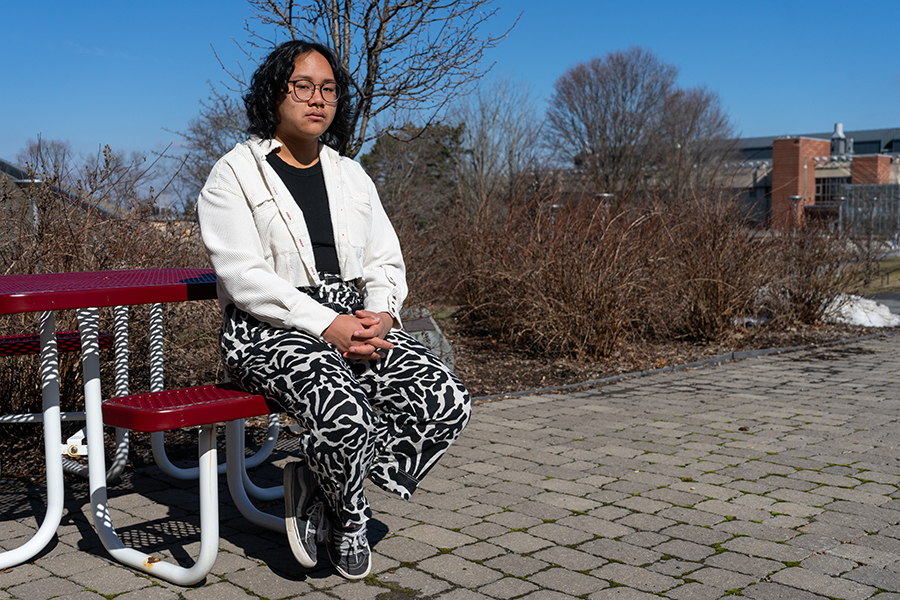Editor’s Note: This is a guest commentary. The opinions do not necessarily reflect the views of the editorial board.
The first Friday of this semester, I was cussed out by a professional Terraces staff member for taking 14 English muffins from the bread box. I was told that “That s— costs money,” and to “Put that s— back.” I was terrified. I was shocked.
I blamed myself at first; maybe I had taken an unreasonable amount of bread, even if I did need it to feed myself. A friend who was with me during the incident explained that the conversation could have been gentler.
The more we unpacked it, the more we realized that this wasn’t about bread: it was about hate. Two darker students of color were being monitored by a white staff member who was watching their every move until they tried to walk away with the bread. There was no lead-up, just cursing.
This isn’t my first time experiencing hate at Terraces. During my first year, a group of students called me the f-slur as I was walking back to my dorm from Terraces. I filled out a Bias Impact Reporting Form in hopes that the people could be reprimanded. The conversation I had after submitting my report felt unproductive and I felt like there was no point in starting a formal investigation.
Terraces has been at the center of more hate crimes and speech than just these two incidents. In the past two years, four swastikas have been found in or near Terraces, with a total of seven on campus. There is only one incident regarding race listed on the Hate Crime Log, however. I’m sure there are other students of color who have experienced hate. Why aren’t hate crimes against students of color met with the same response? Ithaca College should work to make all students feel safe and heard, yet the college remains silent when it comes to the well-being of students of color.
After my bread incident, I asked friends, who are also students of color, about negative experiences they might have had at Terraces. I was told that they were angrily reprimanded for taking “too much” food, yelled at for pouring juice out and judged for what they were eating. They told me that they have either brushed it off, tried to shake off their feelings after experiencing such instances of hate or decided to eat at a different dining hall.
Why does this keep happening?
My aunt explained that maybe this white man was upset to see a student of color getting a college degree that may lead to resentment, but those biases shouldn’t be out in the open when working with students. Have our full-time dining staff received training on working with students? If so, has it been a consistent effort? I wish I knew the answers to these questions.
After my bread incident, I emailed people from the Center for the Study of Culture, Race and Ethnicity, the Center for Equity, Inclusion, and Belonging and the BIPOC Unity Center to tell them what happened. When I spoke to Cliff-Simon Vital, assistant director of the BIPOC Unity Center, about what had happened, he told me that the bread I took cost a total of $1.50. I have decided not to eat at Terraces anymore, to eat at Campus Center Dining hall for only two meals, rely on my seven exchanges, the food pantry and purchase food with my money to get by.
I am frustrated that I am not making the most of my meal plan because I am fearful of experiencing further hate and judgment. I want to be compensated for my unused meal plan, but I was told that not eating at Terraces is only seen as a choice and not a legitimate restriction, so I can’t get compensation. I would like to dedicate my time to a formal investigation, but with classes, school work, jobs and life in general, I am unable to.
Our existing resources for addressing hate aren’t enough. Vital informed me that my informal report is actively being talked about by higher-ups, but I still feel like I haven’t done enough. Even worse, I feel like the college hasn’t done enough. I can’t tell if my experience actually matters, even if it is being investigated informally, because there is no obligation for the college to report back to me on what is happening. It’s also unclear to me if formal investigations even help — even though there are guidelines posted online — and I’m worried about my experience getting lost as time passes.
Ithaca College must train their staff on how to work with students in a college environment, advertise resources for food and create a better protocol for reporting and resolving incidents of hate. All students should feel safe eating in the dining halls that we are paying for. Ithaca College boasts that inclusion is one of its main focuses, so why isn’t that statement being honored?
Claudie Ouk (they/them) is as sophomore race, power, and resistance major. Contact them at [email protected].














